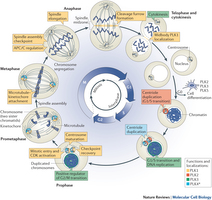Polo-like kinases: structural variations lead to multiple functions
时间:2015-03-09
Nature Reviews Molecular Cell Biology 15, 433–452 (2014) doi:10.1038/nrm3819
Polo-like kinases: structural variations lead to multiple functions
- Nature Reviews Molecular Cell Biology 15, 433–452 (2014) doi:10.1038/nrm3819
- Members of the polo-like kinase (PLK) family are crucial regulators of cell cycle progression, centriole duplication, mitosis, cytokinesis and the DNA damage response. PLKs undergo major changes in abundance, activity, localization and structure at different stages of the cell cycle. They interact with other proteins in a tightly controlled spatiotemporal manner as part of a network that coordinates key cell cycle events. Their essential roles are highlighted by the fact that alterations in PLK function are associated with cancers and other diseases. Recent knowledge gained from PLK crystal structures, evolution and interacting molecules offers important insights into the mechanisms that underlie their regulation and activity, and suggests novel functions unrelated to cell cycle control for this family of kinases.

